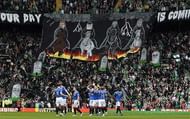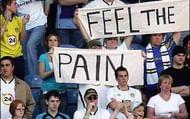The dawn of the new millennium brought an influx of money into the beautiful game, in gregarious amounts, unlike anything seen before. As a result, commercial one-upmanship became the central topic of discussion in boardrooms, as no one wished to be left behind in the financial rat race.
While some clubs benefitted directly due to foreign investments, others had to look for other sources of income to stay relevant. Clubs began spending enormous amounts of money to recruit the best talents in the hope that the players would bring more fans, which in turn meant more money, despite the expenditure outdoing the income by significant margins.
However, while this gamble turned out to be a major success for some clubs, others have not had the same degree of good fortune. In this type of a business model, it is pretty much a one-off shot at success, especially for clubs of smaller stature.
When the players they brought in to attract the crowds, at the risk of insolvency, failed to deliver the standards of football they were supposed to, these clubs faced dissolution and bankruptcy.
With numerous such cases, we take a look at the top 5 clubs who have now gone bankrupt:
#5 Parma
The one-time Italian giants were the recent big name to topple into the crevasse of insolvency. The end of the 2014/15 season saw the Italian club dissolved, despite their rich history and legacy. Those players who chose to stay and fight for that legacy during that season were almost entirely unpaid, and some had to double up as drivers as the club could not afford a driver for the team coach.
Having been relegated from Serie A, they had such a serious debt burden that they were prevented from entering Serie B and now have to work themselves up from the basement, the Italian 4th tier.
Numerous stories have emerged with regard to the seriousness of the situation Parma had found themselves in. From having a match against Udinese postponed due to the club being unable to pay the stewards, to not being able to afford water bottles during training, a 197 million Euro debt crippled the club significantly.
A lot of credit must go to Roberto Donadoni and Hernan Crespo who despite not being paid, steadfastly stood by the club as manager and youth team coach, and tried till the end to save Parma from the drop.
#4 Glasgow Rangers
If you follow football to any reasonable extent, you will have heard of Glasgow Rangers. One-half of the Glasgow rivalry, Rangers are locked in an eternal battle for bragging rights in the city of Glasgow, with their cross-town rivals Glasgow Celtic.
In the late 2000’s, Rangers began overspending whatever meagre earnings they managed to make from the Scottish Premier League. In a bid to make more of a mark on the European stage, Rangers began spending more and more with every passing season, hoping to recruit new talent that would make them a formidable force in Europe. Running up an average of around £13 million of debt every year, they owed the Lloyd’s Banking Group around £30 million by the end of 2009.
The debt was reduced to £18 million in April 2011, but the issues were further compounded by the taxation of the Employee’s Benefit Trust fund to the tune of £49 million by the revenue service of UK. The situation became so bad that David Murray sold his 85% stake to Wavetower Limited in the hope that the owner would pay off the debt and infuse money for new players and stadium upgrades.
That too backfired and Rangers were put into administration and had to work their way up from the Scottish 4th Division.
#3 Fiorentina
What is it with Italian clubs, corrupt and greedy owners, and insolvency? Footballing history is littered with Italian clubs biting the dust thanks to the greed of their owners, who saw the football club as an easy road to financial success.
The 2 time Serie-A winners and 1 time European Cup runners-up were essentially disbanded in 2002 when their financial crisis came out into the open. Their poor financial state was masked by glorious on-field performances by the players. They won the Coppa Italia in 2001 and qualified for the UEFA Cup and everything seemed rosy. However, it was revealed that the club was in debt to the tune of £32 million, big money in those days, and were unable to pay their players on a regular basis.
Such crippling debt eventually took its toll and they were relegated from Serie A at the end of the season. Much like Parma, Fiorentina had too heavy a debt burden to be allowed entry into Serie B, and they had to start from the 4th tier of Italian football.
However, due to the ‘Catania’ case and the subsequent unforeseen circumstances prevailing in Italian football at that time, Fiorentina were allowed to bypass Serie C1 having moved up from Serie C2, and they were back in Serie A at the end of the 2003/04 season.
#2 Leeds United
Leeds United did so well at going from one of the best clubs in Europe to has-beens, in such a short period of time, that they have their own phrase called ‘doing a Leeds’. The phrase can be used for any situation where one has enormous riches, but in pursuit of more, one ends up losing everything.
Leeds were one of the dominant teams of England in the late nineties. They won the last First Division title before it was re-christened as the Premier League. Managing to string together a consistent run of top four finishes, Leeds were always there and thereabouts in the Premier League title race. Over this period, they also started building one of the most formidable teams of the Premier League era.
The likes of Jonathan Woodgate, Rio Ferdinand, Mark Viduka, Harry Kewell and Dominic Matteo were stalwarts in a thriving side. Leeds’ dream culminated in a semi-final appearance in the 2001 Champions League. The club felt there was a need to step up a level and spent extravagantly on players, hoping a consistent influx of revenue from the Champions League and Premier League bonuses would help them overcome initial losses.
In the 2002/03 season, Leeds failed to qualify for the Champions’ League and that tipped them over the edge of the debt precipice. Riddled with a debt of £119 million, they could no longer sustain player wages due to debt repayments. Things reached an all new low when the club voluntarily entered administration before the penultimate game of the 2006/07 season, and incurred a 10 point penalty which got them relegated to League One.
#1 Portsmouth
Quizzing aficionados might easily connect this club with one of the tenants of 221B Baker Street. For the uninitiated, the creator of Sherlock Holmes, Arthur Conan Doyle was an avid follower of the beautiful game, and used a pseudonym, A.C. Smith, to play as a goalkeeper for Portsmouth Association Football Club, the precursor to Portsmouth Football Club.
The legendary author might have created a space-time vortex in the ground with the number of turns he has had to take in his grave, looking at the state of affairs of Portsmouth now.
Running up debts of about £135 million, memories of when mighty AC Milan came over to Fratton Park are a distant recollection in the minds of fans. Having entered administration twice since 2008, when they won the F.A. Cup, Portsmouth have been hardest hit thanks to financial irregularities on the part of the board. They are now in the fourth tier of English football, and paying a heavy price for their debts.
Gone are the days when the club had the likes of David James in goal, Sulley Muntari and Lassana Diarra marshalling the midfield and John Utaka and Nwankwo Kanu running riot amidst opposition defences. It is a mere fight for survival for the 2 time FA Cup winners, with the club trying to claw its way back into the upper echelons of English football.





